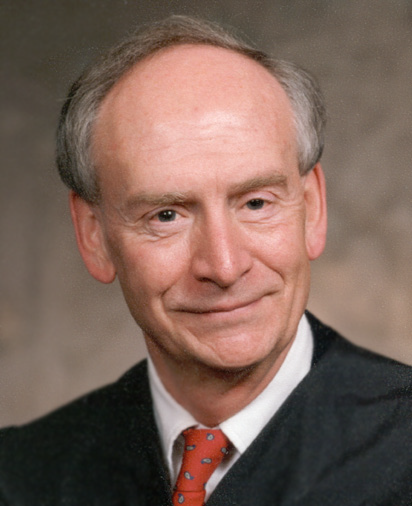Why Crooks Opposed Court’s John Doe Ruling
He votes 90% of time with conservatives, but blasted Gableman’s majority opinion.
On Thursday the Wisconsin Supreme Court released a decision ruling that the John Doe investigation of alleged coordination between Gov. Scott Walker’s campaign and conservative “independent” advocacy groups violated the law and must be terminated. The Milwaukee Journal Sentinel did a story treating it as an ideological battle, contrasting conservative Justice Michael Gableman’s majority opinion with the dissent of liberal Justice Shirley Abrahamson.
But the newspaper completely ignored a dissent by Justice Patrick Crooks, a conservative who has sided with the court’s four member majority on about 90 percent of cases. And Crooks, in clear, common sense language, easily shot down the majority opinion. His dissent makes clear that this is a battle over what the law says, and the law clearly stands behind the Doe investigation, he concluded.
It’s telling that the leader of the court’s majority, Pat Roggensack, is nowhere to be found in this decision, though she signed on to the majority ruling. Roggensack is too smart to dirty her hands with this embarrassing decision, and so, while justices David Prosser and Annette Ziegler wrote concurring opinions, Roggensack doesn’t. She instead lets Gableman, arguably the court’s least qualified member, speak for her, with a decision Abrahamson derided for its “length, convoluted analysis, and overblown rhetoric.”
Gableman’s decision waxes on about the right to free speech, citing cases declaring that the First Amendment allows citizens to speak out politically, as though anyone disagrees with this. In doing so, he is simply channeling the arguments of lawyers for conservative operatives like Eric O’Keefe, leader of the Wisconsin Club for Growth, which was suspected of coordinating its funding and political ads with Walker’s campaign. To investigate this coordination, an outraged O’Keefe declared, hindered his right to political advocacy and free speech.
“But there is a simple solution to that problem,” Crooks dissent noted: “stop coordinating. In the absence of coordination, the contributor is free to discuss candidates and issues” and exercise the right to free speech.
But Gableman is so taken with O’Keefe’s argument that he calls O’Keefe and his fellow challengers “brave.” He declares that special prosecutor Francis Schmitz “has employed theories of law that do not exist in order to investigate citizens who were wholly innocent of any wrongdoing.”
But the legal theory behind the John Doe was quite simple. As Gableman himself describes it, the investigators contended Walker’s campaign and independent groups like Club for Growth and Wisconsin Manufacturers and Commerce actually “worked ‘hand in glove’ such that the independent groups became mere subcommittees of the candidate’s committee, thus triggering reporting and disclosure requirements under Wis. Stat. §§ 11.10(40” and secondly,”the coordinated issue advocacy amounted to an unlawful in-kind contribution to the candidate committee.”
Gableman’s response to this, Crooks notes, is to “erroneously” conclude that Wisconsin campaign finance law does not require a candidate “to report receipt of in-kind contributions in the form of coordinated spending” from which Walker benefitted. Worse, Gableman “inexplicably ignores” the prosecutor’s second argument, Crooks notes. “These mistakes lead the majority to terminate a valid John Doe investigation in an unprecedented fashion,” he declares.
Crooks charges that the court has ignored past rulings by the U.S. Supreme Court as well as a recent Seventh Circuit Federal Court of Appeals ruling on the John Doe which found that “no opinion issued by the [U.S.] Supreme Court, or by any court of appeals, establishes… that the First Amendment forbids regulation of coordination between campaign committees and issue-advocacy groups—let alone that the First Amendment forbids even an inquiry into that topic,” as Crooks writes.
Even before Gableman’s decision, there was reason to suspect its decision was a pre-ordained conclusion. As I have reported, the court’s four-member conservative majority is heavily beholden to two parties to this case. In their last elections, an incredible 76 percent of Prosser’s support came from Club for Growth and Wisconsin Manufacturers. For Gableman, the corresponding figure was 69 percent, for Ziegler 59 percent, for Roggensack 48 percent.
Schmitz therefore requested that at least two of the judges recuse themselves, given the apparent conflict of interest. They refused but issued no explanation for this, an omission which Abrahamson noted was in violation of normal procedure.
All of this screams out a conflict of interest, but Gableman’s opinion, and the concurring opinions by Ziegler and Prosser, make this conflict all the more obvious by over-identifying with O’Keefe and company.
Gableman, similarly, writes about the “paramilitary” style of the investigators, simply accepting the contention of O’Keefe’s lawyers without giving the prosecutors a chance to respond. Ziegler quotes from “media” accounts of alleged over-aggressive investigations, quoting the online Wisconsin Watchdog, created by the Franklin Center for Government and Public Integrity, which was heavily funded by an O’Keefe-run group.
Schmitz, in response to the court’s decision, released a statement charging that “particular justices assert as fact many allegations that I specifically denied in my response materials. There has been no fact-finding hearing conducted at any level establishing… that search warrants were executed unprofessionally or that persons were denied an opportunity to contact their attorneys. All of these search warrants were audio-recorded and it is wrong for the court to accept as true the information alleged…”
Meanwhile the decision ignores the evidence presented by prosecutors of coordination between Walker’s campaign and the “independent” groups, namely that R. J. Johnson both ran Walker’s campaign and was chief consultant for the Wisconsin Club for Growth, that there were many emails showing Walker secretly fundraised for the Club for Growth, that his staff advised the governor to “stress that donations to WiCFG are not disclosed,” and detailing meetings Walker had with donors who soon contributed to Club for Growth, including a check to the club with a memo line saying the check was for Walker. This and more was recently summarized in a Cap Times column.
Had this evidence ever been presented in court, a judge might have found this laundering of money through the Club for Growth allowed Walker to evade campaign laws that restrict the amount of donations made and require disclosure of the names of candidates. If proven, this would show that Walker was running a campaign that illegally used untold amounts of dark money to help win election.
But instead of letting this matter be adjudicated, Gableman and the majority have instead ruled than any such coordination can no longer be prosecuted. “The majority’s errors,” Crooks writes, will “limit the reach of Wisconsin’s campaign-finance law in a manner that will undermine the integrity of our electoral process.” The majority, he suggests, has “abused its power.”
The ruling will open the door to unlimited dark money being raised and spent by supposedly “independent” groups at the direction of candidates from both major parties. Gableman’s poorly argued decision — with no backing from past U.S. Supreme Court decisions — has driven such a huge hole in Wisconsin campaign finance law that “anything goes,” as Abrahamson wrote.
The result is a triumph for O’Keefe’s Club for Growth and the Wisconsin Manufacturers, who together spent $2.6 million to reelect Prosser, $2.6 million on the campaign of Ziegler, $2.3 million on Gableman and $850,000 on Roggensack. They spent generously and the justices rendered just the service these groups sought to purchase.
Murphy's Law
-
Is Legislature Biased Against Working Class?
 Apr 4th, 2024 by Bruce Murphy
Apr 4th, 2024 by Bruce Murphy
-
Associated Press Will Decline in Wisconsin
 Mar 27th, 2024 by Bruce Murphy
Mar 27th, 2024 by Bruce Murphy
-
City Attorney Race Is Vitally Important
 Mar 25th, 2024 by Bruce Murphy
Mar 25th, 2024 by Bruce Murphy


















If Wisconsin had 4 liberal supreme court justices and all received a ton of money from a George Soros or Michael Bloomberg-backed group prior to issuing a ruling favorable to that group, the right would have a conniption fit of epic, unprecedented proportion. Seeing state supreme court justices twist and bend to such extreme positions to support a major funder of their elections is depressing. And I don’t see how unlimited dark money is good for democracy.
Well said.
PMD-You make a good point. Money in the elections for Supreme Court justices is not good at all.
However, I would just add, and Bruce fails to mention, that there were other, supposedly nonpartisan judges who ruled against the Doe investigation (Judge Peterson and Judge Randa for example).
Did comment #3 just use “Judge Randa” and “nonpartisan” in the same sentence? Regardless of distance from any shady campaign finance, he’s been all over some pretty funny rulings that just so happen to benefit one side.
Alison, that’s true, this is the short version of very tangled tale, but Randa was overruled by higher court and both rulings are below Court of Appeals and U.S. Supreme Court.
Allison,
Randa’s decision is very ideological and, as Bruce notes, was overturned on appeal.
Peterson’s has always been a mystery to me. From the following passages it appears he was feeling rushed and may have been overawed by the big-city attorneys:
“The motions were filed over two months ago, before I was even assigned this case. They are overdue for a decision. This decision will be brief, enabling me to produce it more quickly. Any reviewing court owes no deference to my rationale… For more detail, readers should consult the parties’ briefs…….Wisconsin Club for Growth’s analysis of the campaign financing statutory scheme is particularly helpful.”
Imagine if the 7th Circuit appeals judges had cited the Xoff Files in their decision to strike down Georgia Thompson’s conviction, rather than looking at any evidence or legal arguments. Conservatives would have been absolutely enraged, decrying an activist judiciary.
Bruce Murphy has done an excellent job of parsing and summarizing the issues at stake in this blatantly partisan, intellectually dishonest decision. If this case is not taken to the United States Supreme Court, it certainly will become an exhibit in the road back to repealing the Buckley v. Valeo/McCutcheon/Citizen United series of cases that have so badly impaired our democracy. One can also look forward to the day when these four justices will be forced to defend their decision to the voters. The forthcoming judicial elections will be unprecedently partisan, expensive and ugly. They have handed prospective challengers a once in a lifetime issue to campaign on in a judicial election.
About the only possible slight remedy I can suggest is partisan elections for the Supreme Court. Everyone who follows politics at all closely already knows which court candidates are on what side, but this would be useful for low-information voters. Let’s end the present charade.
@Bill Kurtz, appointments to the Supreme Court are not immune from politics. Who makes those appointments? Who makes the rules governing nomination and appointment? Then take a look at today’s attack on the GAB, a partisan effort that would changes the rules of appointment by legislation. And we are back knocking on the door of corruption.
What we ought to consider are limits on money, not limits on our ability to elect our representatives and judges. It is the flood of money that is swamping the power of individual citizens.
Corruption in all but name.
Another excellent Murphy colm which requires more on chances for a successful appeal to the “nonpartisan” US Supremes.
@Bill Sell. Some states use non-partisan commissions to recommend appointments to the appellate courts. I would like to see Wisconsin consider that method.
@Greg, that is easy to ask for. Defining “nonpartisan” is more of a challenge. How does one keep the political funding heavyweights off the scales?
@Bill. Easy. No election–no campaign–no campaign contributions. Anybody on the commission taking clandestine money subject to prosecution for misconduct in public office.
@Greg Carman: Appointed judges are sometimes a curse in disguise. Either you’d have a system like the federal courts or you’d have a system with retention elections. The former isn’t great, as you really can’t ensure accountability. And honestly, it’s even easier for special interest groups, both liberal and conservative, to manipulate retention elections than contested ones.
Bill Sell, I did not advocate appointing the Supreme Court. I suggested keeping it an elective position, but with partisan labels so voters are less likely to be distracted by campaigns centered on irrelevant issues. Your suggestion of limits on contributions is noble, but impossible under the current Supreme Court rulings on campaign finance.
@Bill Kurtz. If we don’t try that money issue won’t change. If we give up on nonpartisan campaigns we will not be making any progress from where we are now. The Supreme Court of Wisconsin actually has gone deeper into the dark woods than the SC of the US; we can and must turn back the “Doe” decision.